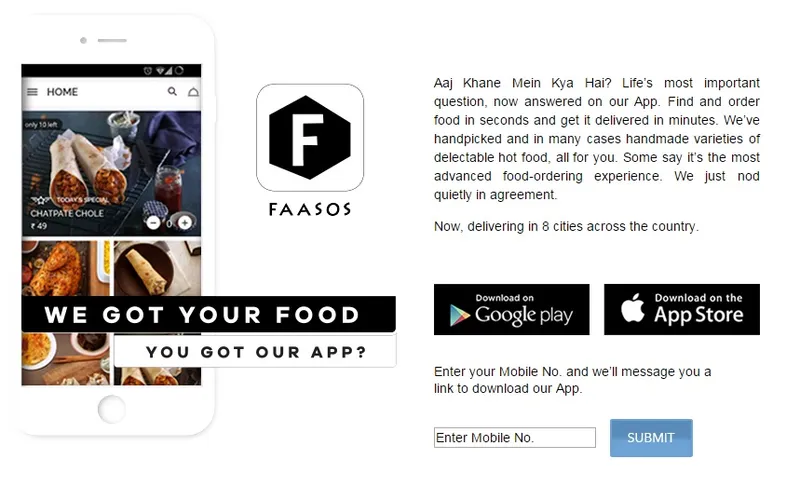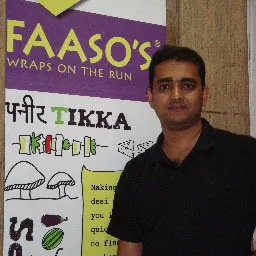Faaso’s will do 120 crore+ in revenues this year, does it have the ‘food-tech’ upper hand?

Faaso’s has been in the business of ‘food-tech’ before it even became a word. Started back in 2003 by IIM-Lucknow alumnus Jaydeep Barman, Faaso’s began from Pune with the QSR (Quick Service Restaurant) model. The idea was to have outlets at strategic locations across cities in India that could serve customers looking for quick and healthy eating-out options. Sequoia Capital backed Faaso’s and the company grew to over 50 outlets over a decade. And then, the frenzy started.
Food-tech is born
As we turned over to the new year in 2015, food-tech as a sector picked up and investors suddenly started showing a massive interest. Buoyed by massive investments in companies like Munchery and Sprig in the west, similar start-ups came up in India. Tinyowl grew quickly in Mumbai and has raised a massive round, Bangalore has its story with Swiggy and there are a bunch of other companies trying out various models- own kitchens, healthy food niche, delivery from restaurants, ready-to-cook meals and more (why are VCs salivating over these companies?)
Zomato made its move by unbundling and launching a separate app for food delivery- Zomato order. It is moving quickly from the consumer downwards to the hotels to own the communication channel.
On Faaso’s side, the company raised a $20 million funding round led by Lightbox ventures to double down its efforts on the tech side and grow further.
The new direction
Faaso’s always had a focus on tech. It was probably the first company in India to start taking orders on Twitter. Faaso’s maintains a call centre, takes orders on the web and also came out with a dedicated app.
The app has 800,000 downloads and they expect to hit a million downloads in a couple of weeks. “We are doing 12000+ orders a day, we sold 8 lac products last month alone,” says Jaydeep. More than 90% of the orders for Faaso's come via the app and the company is likely to shut down the website soon.

One of the biggest developments from Faaso’s was the expansion in terms of offerings. “We started thinking about having occasion (breakfast, lunch, dinner, snacks) based offerings about 6 months ago and rolled out breakfast as a test project. The results encouraged us to take the project out full fledged,” says Jaydeep. Faaso’s started tying up with vendors providing local specialities and integrated the product in their offering. For instance, Faaso’s started having the best Biryani wallah on their platform for a user browsing via the Faaso’s app in Hyderabad or having the capability to deliver a Chettinad Dhosa for a person in Chennai.
“Think of our app as the homepage of a Netflix or Amazon, but for food. We can pop up a personalized menu for individuals which is customized with offerings from around them,” says Jaydeep. Faaso’s is developing their supply chain in a way that the offering can become a ‘personal kitchen on a mobile app’.
Hard Numbers

Faaso’s is operational in 10 cities- Gurgaon, Delhi, Hyderabad, Pune, Mumbai, Chennai, Bangalore, Indore, Ahmedabad and Baroda. It plans to open in 15 more cities. All current cities are up to speed on local sourcing as well as central sourcing. Faaso’s serves via 120+ locations across these 10 cities. As of now, Pune, Mumbai, Bangalore, Chennai and Ahmedabad contribute 80% of the orders.
The company is on track to hit more than INR 120 crores in revenues this year. “These are real sales, not e-commerce GMV,” says Jaydeep with a smile. Faaso’s employs about 1500 people including part timers and riders. Jaydeep is proud of the strong team they have been able to build.
Going forward, is there going to be an overlap with Zomato on the customer facing side? Jaydeep disagrees. He says, “Zomato is about discovery. I think we have a brilliant customer facing app when it comes to actual ordering and getting the food within minutes.” Talking about the space, he goes on to add, “I think there will be aggregators like FoodPanda, Tinyowl, Swiggy and there will be internet kitchens. We are building something totally different - we are building a hyper local food on demand play where we control everything from ordering to food to delivery - your personal kitchen on our app.” The advantage Faaso’s has that it has a strong offline supply chain and presence which has enabled them to generate revenues with bigger margins. And having been there for more than a decade gives Faaso’s the advantage of experience. With the likes of Ola getting into food delivery, more and more logistics companies getting funded, the food-tech segment is wide open and Faaso’s stands a good chance of having a strong say in the market.
Apps: Play Store and iStore






